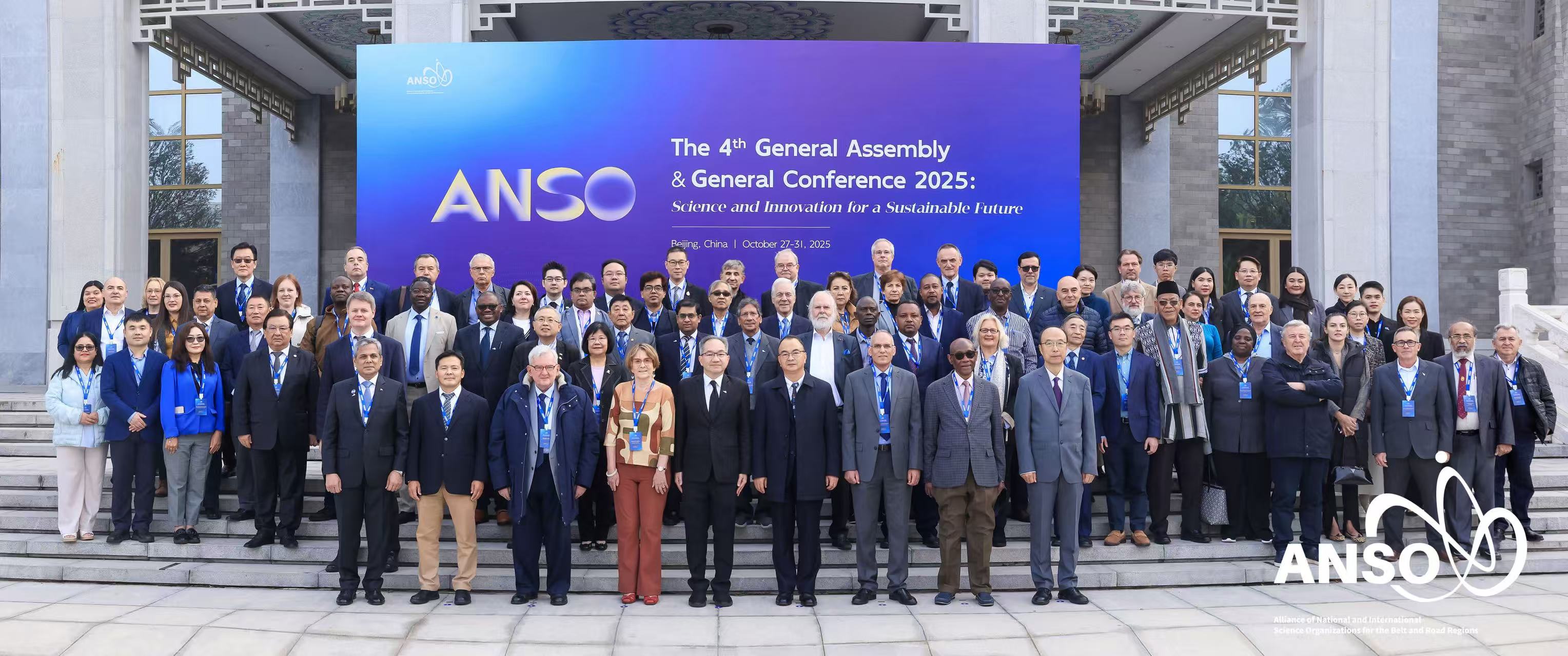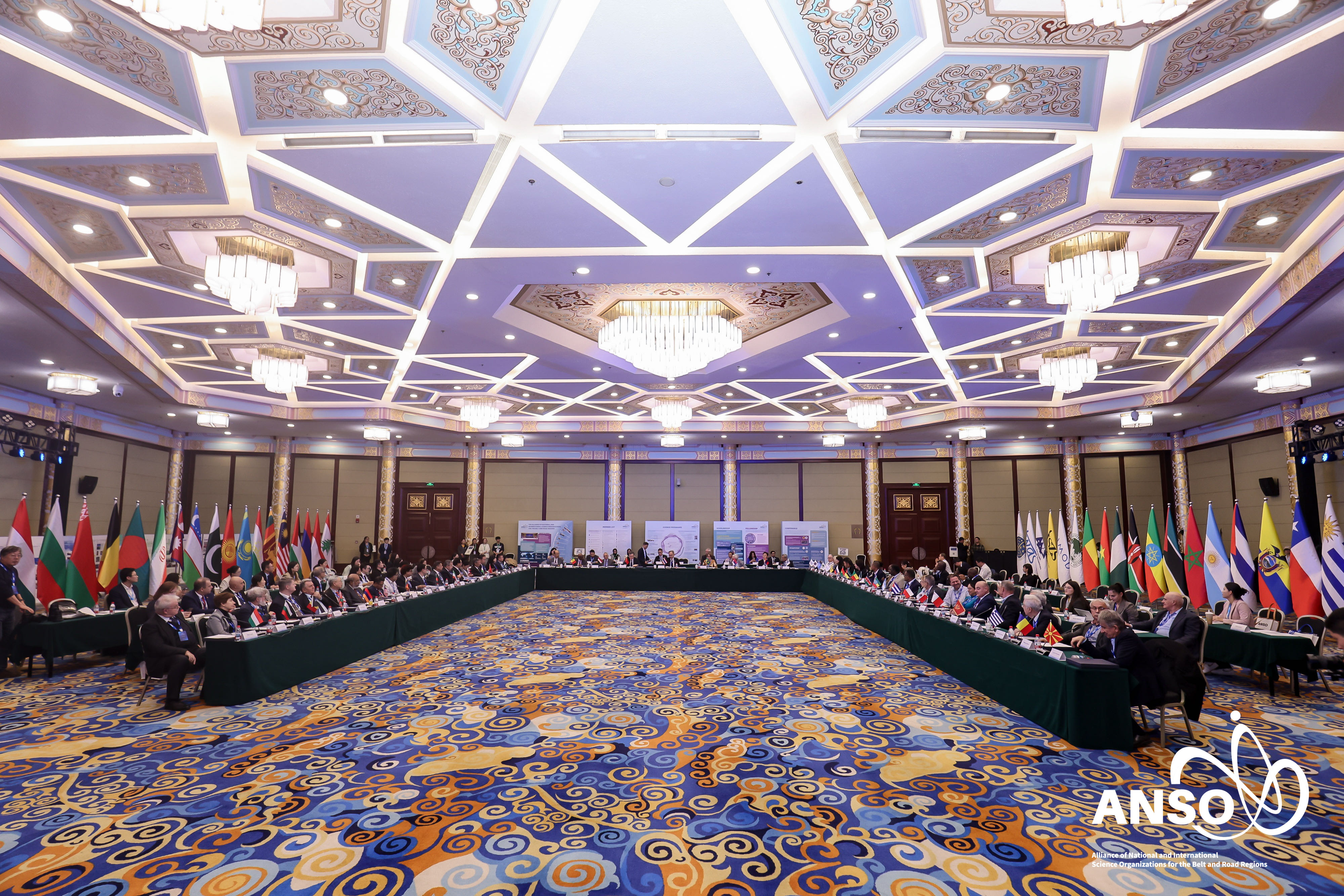From 30-31 October 2025, the 10th Governing Board (GB) Meeting, the 4th General Assembly (GA) and the 11th GB Meeting of ANSO were held in Beijing, China. Over 80 representatives from 52 ANSO member organizations attended the 4th GA on site, spanning 36 countries and 7 international organizations. The GA reviewed the ANSO Progress Report 2024-2025, 19 new membership applications and the proposal on the amendments to ANSO Statutes, elected a new Governing Board for the next term, and endorsed the proposal on membership dues standards and usage.

The first session of the GA was chaired by Prof. Sukit Limpijumnong, ANSO President and President of the National Science and Technology Development Agency (NSTDA). He opened the meeting by welcoming all delegations of the ANSO members. He reviewed ANSO’s efforts and accomplishments since the 3rd GA, affirming the contributions of ANSO’s programs to advancing the UN Sustainable Development Goals (SDGs) and to promoting high-quality collaborations under the Belt and Road Initiative.
Prof. Helena B. Nader, Vice President of ANSO and President of the Brazilian Academy of Sciences (ABC), delivered her welcome remarks, expressing her gratitude for the support and cooperation of all member institutions. She highlighted ANSO’s unique strength in bringing together the collective power of scientific institutions from developing countries and focusing on South-South cooperation.
The GA approved the ANSO Progress Report 2024-2025, which was presented by Prof. LIU Weidong, Executive Director of ANSO. In this report, Prof. LIU outlined ANSO’s progress in implementing the decisions made by the 3rd GA and the meetings of the GB, refining ANSO’s vision & mission for better alignment with the UN SDGs, optimizing ANSO’s portfolio of programs to better fulfill its vision & mission, and expanding ANSO membership & partnership to develop a global network of networks. He also reported on the launch of ANSO Africa Hub of Science & Innovation (AAHSI), the Alliance of National and International Innovative Enterprises for the Belt and Road Regions (ANIE) and International Research Network on AI Development and Governance earlier this year and invited all ANSO members to join or support the initiatives.
The GA approved the proposal endorsed by the GB on Amendments to the ANSO Statutes, which included the collection of ANSO Membership dues and the addition of a new category to ANSO Membership: innovative enterprises. These amendments were taken as necessary to enhance ANSO’s partnership with industry to further promote the UN Sustainable Development Goals (SDGs), as well as to increase and diversify the financial sources of ANSO.
The GA approved 19 new applications for ANSO membership. The applicants approved are:
-Iran National Science Foundation (INSF), Iran
-Sofia University St. Kliment Ohridski, Bulgaria
-University Ss. Cyril and Methodius in Skopje, North Macedonia
-Landmark University, Nigeria
-Tanzania Fisheries Research Institute (TAFIRI)
-Tigray Agricultural Research Institute, Ethiopia
-Malaysian Industry-Government Group for High Technology (MIGHT), Malaysia
-University of Antananarivo, Madagascar
-National University of Laos (NUOL), Laos
-Cyprus Academy of Sciences, Letters, and Arts
-The Instituto Tecnológico de Costa Rica (ITCR), Costa Rica
-University of Zambia, Zambia
-Quaid-i-Azam University, Pakistan
-National Council for Scientific Research (CNRS-L), Lebanon
-National and Kapodistrian University of Athens, Greece
-University of Pretoria, South Africa
-Sahara and Sahel Observatory, International Organization headquartered in Tunis
-Food and Agricultural Research and Extension Institute (FAREI), Mauritius
-Samarkand State University named after Sharof Rashidov, Uzbekistan
With this development, ANSO has grown from initial 37 members in 2018 when it was established to 96 members to date, spanning 59 countries and 9 international organizations. It now enjoys a greater diversity in membership structure and a growing international impact.

The General Assembly elected the new Governing Board for the next term through secret ballot. The Chinese Academy of Sciences (CAS) was elected as the ANSO President Organization, while the Serbian Academy of Sciences and Arts (SASA) and the National Academy of Sciences and Techniques of Senegal (ANSTS) were elected as the Vice-President Organizations of ANSO. Besides, six ANSO Members, including the Mongolian Academy of Sciences (MAS), the National Research Centre (NRC) of Egypt, the Commission on Science and Technology for Sustainable Development in the South (COMSATS), Universidad de Chile, University of Donja Gorica (UDG), and the Academy of Sciences of the Republic of Uzbekistan, were selected as Members of the ANSO Governing Board.
Prof. Nebojša Lalić, Secretary-General of the Serbian Academy of Sciences and Arts (SASA), and Prof. Moctar Toure, President of the Senegal Academy of Science and Technology (ANSTS) gave remarks on behalf of the newly-elected Vice President Organizations, thanking all members for their support, and expressing full commitment to advancing the objectives of ANSO.
In recognition of their outstanding contributions to achieving ANSO’s goals during their tenure as President and Vice President, Prof. Limpijumnong and Prof. Nader were conferred with prestigious ANSO Certificates of Honor by the GA.
The second session of the GA held on the morning of 31 October was chaired by Prof. HE Hongping, Vice President of CAS, who acted as the representative of the newly-elected President Organization of ANSO.
The GA meeting endorsed the proposal on membership dues standards and usage, and opened a general discussion session, where representatives from each and every ANSO member organization introduced their organizations and made invaluable suggestions on the priorities of the future development of ANSO, including incorporating peace into the vision & mission of ANSO to advance a sustainable future, establishing more regional hubs, enhancing collaboration on AI technology transfer and governance, attaching greater importance to capacity building of the future generations of scientists, so on and so forth. The discussion was chaired by Prof. Toure.
In conclusion, Prof. HE Hongping gave a brief review of the main outcomes of the GA, reiterating the vision of ANSO in advancing the UN SDGs and promoting the development of a community with a shared future for humankind. He emphasized the critical importance of strengthening the membership network and expressed gratitude for the contributions of all member organizations.
The 10th and 11th ANSO Governing Board meetings were organized consecutively during the 4th General Assembly, reviewing the agenda and materials submitted for the GA. As an integral part of the GA, ANSO hosted the 2025 General Conference on Science and Innovation for a Sustainable Future from October 28 to 29. A number of representatives from ANSO member organizations delivered excellent presentations and/or participated in the panel discussions.